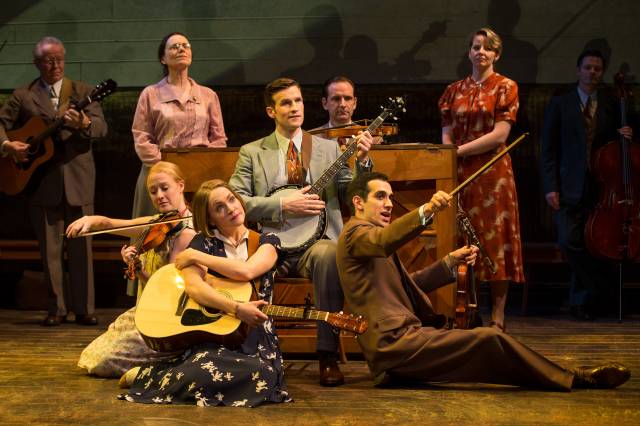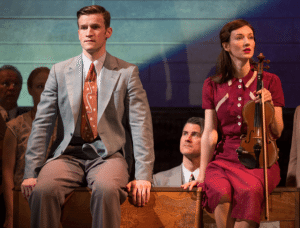

All right, let’s admit it, Allegro has a dissonant past. Written after the blinding success of both Oklahoma! and Carousel, and historically considered Rodgers and Hammerstein’s first flop, it played slightly over a year on The Great White Way in 1947, and then closed with no Broadway revivals thereafter. Frequently likened to Thornton Wilder’s Our Town and generally suffering by the comparison, it became a thorn in the side of its director Agnes de Mille. How can this be? How does a brilliant trio of collaborators like Richard Rodgers, Oscar Hammerstein and Agnes de Mille take a simple story (based in part on Hammerstein’s own struggles with success) and lose their path? A path strewn with large choruses of singers and dancers, a path paved sweetly with a simple dramatic arc, the theatrical tenets of past success for these illustrious artists?
Classic Stage Company’s taut, compelling production of Rodgers and Hammerstein’s Allegro (helmed with effortless genius by director John Doyle) has solved many of the dilemmas the original production may have suffered. Mr. Doyle has created a clear vision for this Allegro which Mr. Rodgers, Mr. Hammerstein and (dare I say it) Ms. de Mille would be proud to acknowledge as a continuation of their respective, glorious legacies.
The story follows one Joseph Taylor, Jr. (played gracefully by Claybourne Elder) the son of a doctor (played handsomely by Malcolm Gets) as he makes his way to the big city of Chicago. Joe Jr., at the urging of his lovely and manipulative wife (played with deliciously alarming certainty by Elizabeth A. Davis) embarks on a career at a prestigious hospital and eventually loses his way there, catering to the worried wealthy denizens of society’s upper crust. Fortuitously, at the play’s climax, he realizes a devastating truth. I won’t give it away, but herein lies the quiet majesty of CSC’s Allegro. (After the final reprise of "Come Home", following the pinnacle of Joe’s realization, you could have heard a pin drop in the theatre.)

With three concise, carefully chosen iconic abstractions -- the beat of a man’s heart (pulsing throughout the 90-minute version at CSC) a shaft of light streaming across a skyscraper’s window, a deceased mother’s favorite wooden chair -- Mr. Doyle tells the story of a man’s life and burgeoning career in a big city. These images are a stunning counterpoint to the "actor muso" concept for which Mr. Doyle is renowned. Precise orchestrations are used to underscore the subtext of each character's narrative; a manipulative female plays her violin so that the sweeter girl's guitar strains ("So Far") never really reach our hero's ears. Mr. Doyle’s direction is dazzlingly lean, pared down disarmingly well – but make no mistake, you are being held to account here as a viewing member of the proceedings. The lecturing and posturing, frequently referred to in the original production as unwieldy, is utilized earnestly here; lights up on the audience, actors right in your face, it now resembles the work of the WPA’s Federal Theatre Project of the late 1930’s. Mr. Doyle’s work likens this lovely gem to Waiting for Lefty and The Cradle Will Rock rather than Our Town.
Without the giant sets, the voluminous costumes, the trappings of a big Broadway Musical you have a brilliant little gem of a show, way ahead of its time. Its time is now. Borrowing the lyrics from the title song, Allegro, “don’t, stop, whatever you do!” Don’t miss out, work your way to Classic Stage Company's exquisite coup de theatre, Allegro.
Allegro, directed by John Doyle, starring Claybourne Elder, Malcolm Gets and Elizabeth A Davis, plays a limited engagement through Sunday, December 14th, at CSC (130 East 13th Street). Musical direction and orchestrations by Mary-Mitchell Campbell; original orchestrations by Robert Russell Bennett; original dance arrangements by Trude Rittmann; original choral arrangements by Crane Calder; costumes by Ann Hould-Ward; lighting by Jane Cox; sound by Dan Moses Schreier; hair, wig and makeup design by Rob Greene and J. Jared Janas; associate music director, David Gardos; associate set design, David L. Arsenault; associate costume design, Abigail Hahn; associate lighting design, Cecilia Durbin; associate sound design, Nicholas Pope; production supervisor, Production Core; general manager, John C. Hume. Presented by Classic Stage Company, Brian Kulick, artistic director; Jeff Griffin, managing director; Greg Reiner, executive director. For more information and tickets please go to www.classicstage.org
Through December 14 at Classic Stage Company.